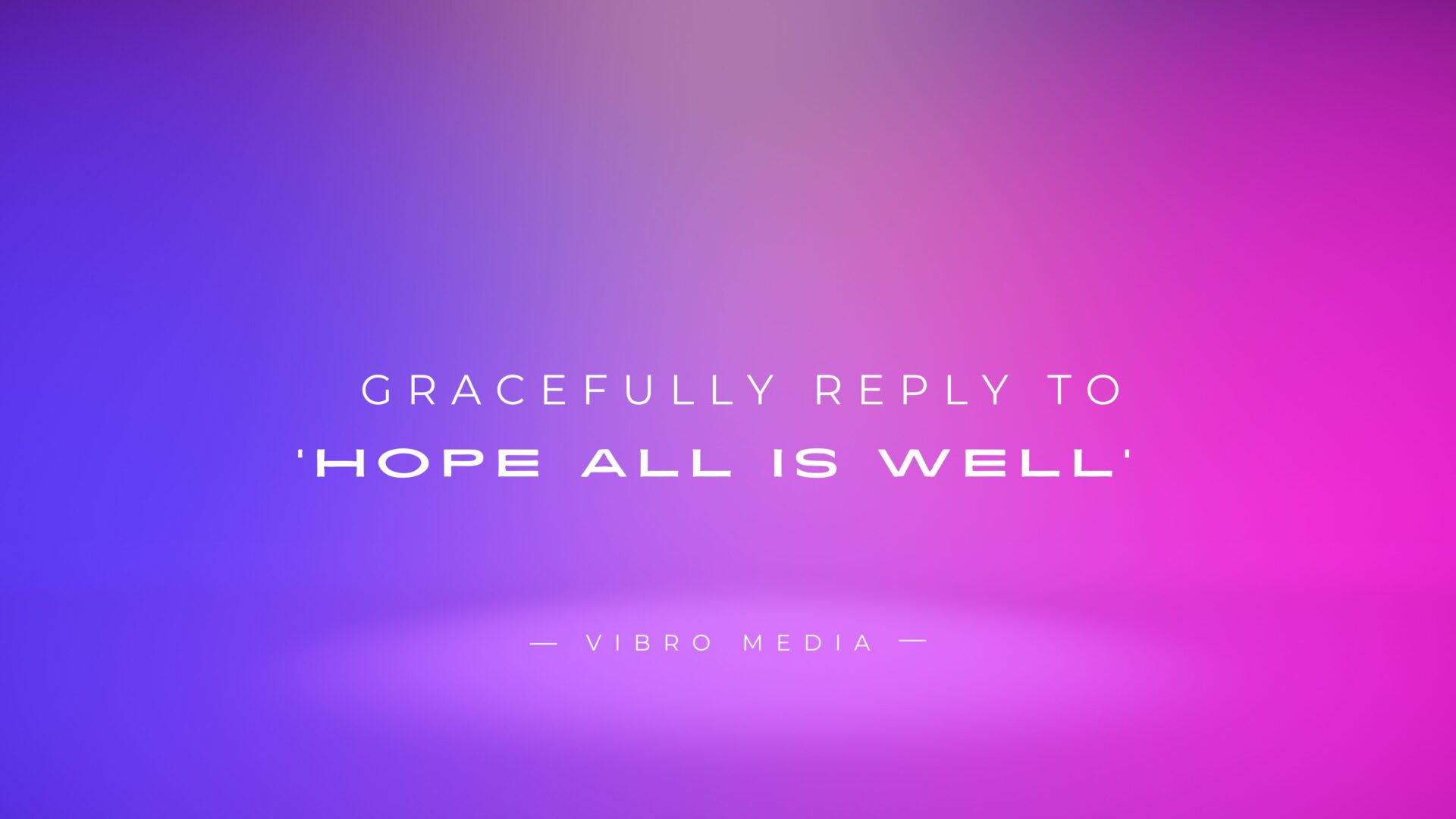Navigating the waters of social niceties can be tricky, especially when replying to a phrase as ubiquitous as “Hope all is well.” Whether you’re responding to a professional email or a casual text from a friend, knowing how to reply gracefully can leave a lasting impression. Let’s dive into crafting thoughtful, appropriate responses that suit various contexts.
Understanding the Context
- Professional vs. Personal Contexts
First things first: consider the context. Is the message from a colleague or your best friend? The nature of your relationship will significantly influence your response. Professional contexts usually require more formality and brevity, while personal interactions provide warmth and detail.
- Identifying the Tone of the Message
The tone of the original message should be considered. By matching the sender’s tone, you demonstrate that you are observant and sensitive enough to create a platform for accessible communication.

200+ Gracefully Reply to ‘Hope All Is Well’
Expressing Gratitude
- Thank you so much! I hope things are wonderful for you too.
- I appreciate your kind words. I hope you’re doing well, too.
- Thank you! Your thoughtfulness means a lot.
- I appreciate it! Sending good vibes your way.
- Thanks a lot! I hope everything is great with you.
- Thank you! It’s lovely to hear from you. I hope you’re well too.
- I appreciate your well wishes. I’m hoping all is well with you.
- Thanks for thinking of me! I hope you’re having a great day.
- Thank you! I hope all is well in your world too.
- I appreciate it! I hope you’re doing fantastic as well.
Sharing Positive Updates
- Thank you! Yes, things are going great here.
- Thanks! All is well, and I’m enjoying some new projects.
- I appreciate it. Life’s been good, and I’m feeling positive.
- Thank you! Everything is running smoothly on my end.
- Thanks! I’ve been keeping busy but doing well.
- I appreciate it. Yes, things are looking up!
- Thank you! All is well, and I’ve been making good progress on my goals.
- Thanks! Things are fantastic, and I’m excited about what’s ahead.
- I appreciate it. I have been having a productive and fulfilling time lately.
- Thank you! I’m doing well and enjoying life.
Expressing Concerns or Challenges
- Thank you for asking. It’s been a bit tough lately, but I’m managing.
- I appreciate your concern. Things have been challenging, but I’m getting through it.
- Thank you. I’m dealing with some issues right now, but I’m hopeful.
- Thanks for reaching out. It’s been a rough patch, but I’m working on it.
- I appreciate it. Things haven’t been easy, but I’m staying positive.
- Thank you. I’ve been facing some difficulties, but I’m hanging in there.
- Thanks for your kind words. It’s been a challenging time, but I’m coping.
- I appreciate it. Life has thrown some curveballs, but I’m persevering.
- Thank you. It’s been a bit of a struggle lately, but I’m doing my best.
- Thanks for your concern. I’m dealing with some challenges but hopeful for better days.
Reciprocal Well-Wishes
- Thanks! Hope you’re doing well too.
- I appreciate it. Wishing you the best as well!
- Thank you! Hope everything is great with you too.
- Thanks! I hope all is well on your end too.
- I appreciate it. Sending good wishes your way too!
- Thank you! Hope you’re having a wonderful day.
- Thanks! I hope you’re thriving as well.
- I appreciate it. Wishing you all the best!
- Thank you! Hope things are going smoothly for you too.
- Thanks! Hope you’re enjoying life as well.
Neutral or General Responses
- Thank you! How have you been?
- Thanks for reaching out. How are things on your end?
- I appreciate it. What’s new with you?
- Thanks! How’s everything going with you?
- Thank you! What’s been keeping you busy lately?
- I appreciate it. How’s life treating you?
- Thanks! How are things on your side?
- Thank you. How have things been with you?
- I appreciate it. What have you been up to?
- Thanks! How’s everything in your world?
Professional or Formal Responses
- Thank you for your kind wishes. I hope all is well with you too.
- I appreciate your concern. I hope you’re doing well also.
- Thank you for your message. I trust all is well on your end.
- Thanks for reaching out. I hope everything is great with you.
- I appreciate your kind words. I hope you’re having a productive week.
- Thank you for your well wishes. I hope you’re thriving too.
- I appreciate it. I trust you’re doing well also.
- Thank you. I hope this message finds you well.
- Thanks for your kind message. I hope all is good with you too.
- I appreciate your thoughtful note. I hope everything is going smoothly for you.
Humorous or Light-Hearted Responses
- Thanks! Well, I’m surviving. How about you?
- Appreciate it! All systems are functioning within normal parameters.
- Thanks! I’m alive and kicking, can’t complain!
- Thank you! Just trying to stay out of trouble.
- Thanks! All is well, or at least as it gets in this crazy world!
- I appreciate it! Just another day in paradise.
- Thanks! Doing my best to stay out of mischief.
- Thank you! I’m still in one piece, so that’s something!
- Thanks! Trying to keep it together, one coffee at a time.
- Appreciate it! Just taking life one meme at a time.
Brief Responses
- Thanks! You too.
- I appreciate it.
- Thank you!
- Thanks a lot!
- Thanks! Hope you’re well.
- I appreciate it. You too.
- Thanks!
- Thank you. Same to you.
- Thanks! Hope all is good.
- Appreciate it!
Deflecting to the Other Person
- Thank you! How have you been doing?
- I appreciate it. How’s everything going with you?
- Thanks! What’s new in your world?
- Thank you. How are things on your end?
- I appreciate it. How have you been lately?
- Thanks! How’s life treating you?
- Thank you! What have you been up to?
- I appreciate it. How are things going with you?
- Thanks! How have things been with you?
- Thank you. How’s everything in your life?
Acknowledging the Sentiment
- Thanks for the good vibes!
- I appreciate the sentiment. Hope all is well with you too.
- Thank you! It’s nice to hear from you. How have you been?
- I appreciate it. It’s been a while! How are things with you?
- Thanks! I appreciate your kind words.
- I appreciate it. I hope you’re doing well too.
- Thank you! That means a lot. How are you?
- Thanks! I’m grateful for your thoughts. How have you been?
- I appreciate it. Sending positive thoughts your way too!
- Thank you! Your message brightened my day. How’s everything with you?
Seeking Continuation of Conversation
- Thank you! How’s everything on your side?
- I appreciate it. How have things been with you?
- Thanks! What have you been up to lately?
- Thank you. How’s work/family/life treating you?
- I appreciate it. What’s new in your life?
- Thanks! I’d love to catch up. How are things going?
- Thank you. How have you been keeping busy?
- I appreciate it. What’s been happening with you?
- Thanks! Let’s chat more. How’s your week been?
- Thank you. I’d like to hear more about what you’ve been up to lately.
Expressing Surprise or Curiosity
- Thanks! I wasn’t expecting to hear from you. How have you been?
- I appreciate it. It’s great to hear from you! What’s new?
- Thank you! I’m surprised to hear from you. How are things?
- I appreciate it. I didn’t expect this message. How’s life treating you?
- Thanks! It’s a pleasant surprise. What have you been up to lately?
- Thank you. This was unexpected. How have you been?
- Thanks! I’m curious to know how you’ve been doing.
- I appreciate it. I’m intrigued! How are things on your end?
- Thanks! I’m pleasantly surprised. How have you been?
- Thank you. This made my day! What’s been going on with you?
Seasonal or Contextual Replies
- Thank you! Enjoying the summer so far. How about you?
- I appreciate it. Looking forward to the holidays. How about you?
- Thanks! Spring is here, and everything’s blooming. How’s your season going?
- Thank you! The fall weather is lovely. How are you enjoying it?
- I appreciate it. Winter’s approaching. Are you ready for the colder weather?
- Thanks! Enjoying the long days of summer. How’s your summer been?
- Thank you! Getting ready for the festive season. How about you?
- I appreciate it. Spring has been refreshing. How’s your spring been?
- Thanks! Hoping for some good weather soon. How’s your day been?
- Thank you! Enjoying the cool weather. How are you feeling?
Expressing Busy Schedules
- Thanks! I’ve been quite busy lately but doing well.
- I appreciate it. It’s been hectic, but I’m hanging in there.
- Thank you. Things have been busy, but I’m managing.
- Thanks for asking. I have been juggling a lot, but it is all good.
- I appreciate your concern. I’ve been swamped, but things are moving forward.
- Thank you! Been a bit crazy, but I’m keeping up.
- Thanks! Busy as ever, but staying positive.
- I appreciate it. Work’s been demanding, but I’m making progress.
- Thank you. It’s been non-stop, but I’m handling it.
- Thanks for reaching out. I’ve been on the go, but hanging in there.
Reflecting on Personal Growth or Learning
- Thank you! I’ve been learning a lot lately and feeling fulfilled.
- I appreciate it. I’ve been focusing on personal growth, and it’s been rewarding.
- Thanks! I’ve been reflecting on my journey and making positive changes.
- Thank you. I’ve been learning from new experiences and growing as a person.
- I appreciate your concern. I’ve been working on myself and feeling optimistic.
- Thanks! I’ve been exploring new ideas, and it’s been eye-opening.
- Thank you! I’ve been challenging myself and learning a lot in the process.
- I appreciate it. I’ve been expanding my skills, and it’s been a great journey.
- Thanks! I’ve been reflecting on my goals and making progress step by step.
- Thank you. I’ve been learning to balance work and personal life better.
Expressing Excitement or Enthusiasm
- Thanks! I’m excited about some new opportunities coming up.
- I appreciate it. I’ve been feeling enthusiastic about a new project.
- Thank you! I’m thrilled about a recent achievement.
- Thanks for asking. I’m excited about what the future holds.
- I appreciate your concern. I’m feeling enthusiastic about my current endeavors.
- Thanks! I’m excited about a new hobby I’ve started.
- Thank you! I’ve been enthusiastic about some recent developments.
- I appreciate it. I’m excited about some upcoming plans.
- Thanks! I’m feeling enthusiastic about a new chapter in my life.
- Thank you. I’m excited about some positive changes happening right now.
Health-Focused Replies
- Thank you! I’ve been taking care of my health and feeling good.
- I appreciate it. Staying healthy and active.
- Thanks! I’ve been focusing on my well-being, and it’s been paying off.
- Thank you. Taking it one day at a time, but feeling good.
- I appreciate your concern. Health-wise, I’ve been doing well.
- Thanks! I’ve been prioritizing self-care, and it’s been beneficial.
- Thank you! I’ve been feeling healthy and strong.
- I appreciate it. My health has been good, thanks for asking.
- Thanks! I’ve been staying fit and healthy.
- Thank you. I’ve been managing my health and feeling positive.
Family or Personal Life Updates
- Thanks! The family is doing well.
- I appreciate it. Kids are growing up fast and keeping me busy.
- Thank you! Enjoying quality time with loved ones.
- I appreciate your concern. Family life is good, thanks.
- Thanks! My personal life is fulfilling and enjoyable.
- Thank you. I’ve been spending time with family, and it’s been great.
- Thanks! Family life has been rewarding and busy.
- I appreciate it. My personal life is full of blessings.
- Thank you! Enjoying life’s little moments with family.
- I appreciate your kind words. Everything’s going well on the home front.
Travel or Location-Based Replies
- Thank you! Just got back from a beautiful trip. How about you?
- I appreciate it. Currently exploring a new city. What about you?
- Thanks! Enjoying some time in [location]. How’s everything with you?
- Thank you. Traveling has been refreshing. How’s your day been?
- I appreciate it. Just returned from a relaxing vacation. How are you doing?
- Thanks! Discovering [location] has been exciting. How about you?
- Thank you! Traveling has been a blast. What have you been up to?
- I appreciate it. Enjoying the sights and sounds of [location]. How’s life treating you?
- Thanks! Currently exploring [location]. How’s everything going with you?
- Thank you. Traveling has been rejuvenating. How are things on your end?
Reflecting on Recent Events or News
- Thanks! I just celebrated a significant milestone. How have you been?
- I appreciate it. Recently, we had some exciting news. How about you?
- Thank you. I just finished a significant project. What’s new with you?
- I appreciate it. Recently, we had an eventful week. How’s your week been?
- Thanks just heard some great news. How are things on your end?
- I appreciate it. I just experienced something amazing. How about you?
- Thank you. You just had an eventful day. How’s your day been?
- I appreciate it. Recently, we had an exciting event. What’s new with you?
- I just celebrated a special occasion. How have you been?
- I appreciate it. I just a great experience. How are things on your end?
General Principles for Responding
- Be Polite and Courteous
Irrespective of the respondent, good manners are very important in this case. The receiver’s salutation should be acknowledged, and thanks should be given for his or her goodwill.
- Keep It Concise
Especially in professional settings, brevity is appreciated. Get to the point without unnecessary fluff, but don’t skip the pleasantries.
- Match the Tone
Aligning your tone with that of the sender helps maintain a cohesive conversation. Suppose they’re formal, lean towards formality. If they’re casual, feel free to loosen up a bit.
Balancing Formality and Informality
- Recognizing the Relationship Level
Evaluate how well you know the person. An informal response to a top executive would be out of place; however, it would sound awkward if you responded formally to a best friend.
- Adjusting Your Language Accordingly
Adjust your language to fit the situation. Formal language suits professional environments, while informal language is better for personal interactions.
Tips for Effective Communication
- Being Genuine
Authenticity goes a long way. Be sincere in your responses and avoid overly scripted replies.
- Showing Appreciation
A little gratitude can make a big difference. Acknowledge the sender’s well wishes genuinely.
- Avoiding Overly Complex Language
Ensure that your language is unambiguous and straightforward to make your message comprehensible.
Common Mistakes to Avoid
- Being Too Formal or Too Casual
It is important to strike the right balance and not be too stiff in casual situations or relaxed in professional situations.
- Ignoring the Initial Greeting
Attending to the sender’s original salutation is essential to demonstrating that one is present and empathetic.
- Overloading with Information
Don’t overwhelm the recipient with too much information. Keep it relevant and to the point.
Cultural Considerations
- Understanding Cultural Differences
Different cultures have different greetings and response norms. Watch out for these diversities, particularly in global communication.
- Adapting to International Etiquette
Ensure you respond appropriately to the culture of the person you are addressing to being respectful and sensitive.
Leveraging Technology
- Using Email Templates
Consider applying email templates for regular professional communications to generate quick, polished answers.
- Responding via Social Media
Usually, a short and informal response is enough if the message is on social media.
When Not to Reply
- Recognizing Spam or Generic Messages
There are some messages that do not require responses, such as those that sound generic or spam-like.
- Prioritizing Important Communications
Focus on replying to messages that warrant a response, prioritizing based on importance and relevance.
Conclusion
In conclusion, responding to “Hope all is well” can be a chance to connect meaningfully with others, whether expressing gratitude, sharing updates, or reflecting on personal growth. Acknowledging the sentiment with warmth and sincerity can create a positive exchange that strengthens relationships. With these diverse responses in mind, navigating this standard greeting becomes an opportunity to show empathy and care. For more ideas on responding gracefully, check out our comprehensive guide to over 200 replies to “Hope you are doing well”.
FAQs
Q. What if I’m not sure how to respond?
Take a moment to consider the context and tone of the message. A simple, polite response is always a safe choice.
Q. How do I keep my response professional?
Stick to formal language, be concise, and avoid personal anecdotes unless appropriate.
Q. Can I use emojis in my reply?
It is best to avoid emojis in professional settings unless you know the person you’re sending it to. In light of this, emojis can express your mood or attitude towards someone in personal messages.
Q. What if I don’t know the person well?
Keep your response polite and neutral. A standard reply works well in this scenario.
Q. How do I handle awkward situations?
Be polite in your greetings and ensure the conversation moves towards a neutral or positive subject.










